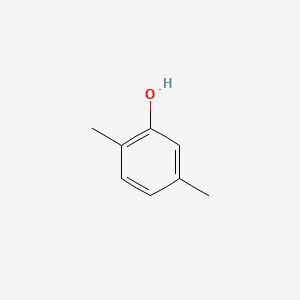

1. 95-87-4
2. 2,5-xylenol
3. P-xylenol
4. Phenol, 2,5-dimethyl-
5. 3,6-dimethylphenol
6. 6-methyl-m-cresol
7. 3,6-xylenol
8. 1-hydroxy-2,5-dimethylbenzene
9. 1,2,5-xylenol
10. 2,5-dmp
11. 2-hydroxy-p-xylene
12. 2,5-dimethyl Phenol
13. 1,4-dimethyl-2-hydroxybenzene
14. 2,5-dimethyl-phenol
15. Fema No. 3595
16. Nsc 2599
17. Fema 3595
18. Xh3e3564kx
19. Nsc-2599
20. Phenol, 2,5-dimethyl-, Homopolymer
21. Mfcd00002237
22. Dsstox_cid_5145
23. Dsstox_rid_77686
24. Dsstox_gsid_25145
25. 25498-21-9
26. 2,5-dimethylphenol (p-xylenol)
27. Cas-95-87-4
28. Ccris 722
29. 2.5-dimethyl Phenol
30. Hsdb 5296
31. Einecs 202-461-5
32. Brn 1099260
33. Unii-xh3e3564kx
34. Ai3-01551
35. Hydroxy-p-xylene
36. P-2-xylenol
37. 2,5'-xylenol
38. 2,5-xylenol, 8ci
39. Ec 202-461-5
40. Schembl92202
41. 4-06-00-03164 (beilstein Handbook Reference)
42. Wln: Qr B1 E1
43. Dimethylphenol, 2,5-
44. 2,5-xylenol [fhfi]
45. Chembl192591
46. 2,5-dimethylphenol, >=99%
47. Dtxsid6025145
48. Nsc2599
49. Chebi:191381
50. Xylenol 2,5-dimethylphenol
51. 2,5-dimethylphenol [hsdb]
52. 2,5-xylenol, >=99%, Fg
53. Bcp25858
54. Zinc1641024
55. Tox21_201275
56. Tox21_300326
57. Stk358774
58. Akos000119348
59. Ac-2517
60. Ccg-302495
61. 2,5-dimethylphenol, Analytical Standard
62. Ncgc00091587-01
63. Ncgc00091587-02
64. Ncgc00091587-03
65. Ncgc00254281-01
66. Ncgc00258827-01
67. Xylenol 2,5-dimethylphenol [mi]
68. Bs-42340
69. Db-027652
70. Metacresol Impurity G [ep Impurity]
71. Am20050203
72. D0775
73. Ft-0610471
74. Gemfibrozil Impurity A [ep Impurity]
75. 2,5-dimethylphenol 100 Microg/ml In Methanol
76. A25190
77. E89326
78. J-507373
79. 2,5-dimethylphenol, Pestanal(r), Analytical Standard
80. Q26840762
81. F0001-2283
82. Z955123682
83. Xylenol(2,5-) 1,2,5-xylenol 1,4-dimethyl-2-hydroxybenzene 1-hydroxy-2,5-dimethylbenzene 2,5-dimethyl-pheno
| Molecular Weight | 122.16 g/mol |
|---|---|
| Molecular Formula | C8H10O |
| XLogP3 | 2.3 |
| Hydrogen Bond Donor Count | 1 |
| Hydrogen Bond Acceptor Count | 1 |
| Rotatable Bond Count | 0 |
| Exact Mass | 122.073164938 g/mol |
| Monoisotopic Mass | 122.073164938 g/mol |
| Topological Polar Surface Area | 20.2 Ų |
| Heavy Atom Count | 9 |
| Formal Charge | 0 |
| Complexity | 90.6 |
| Isotope Atom Count | 0 |
| Defined Atom Stereocenter Count | 0 |
| Undefined Atom Stereocenter Count | 0 |
| Defined Bond Stereocenter Count | 0 |
| Undefined Bond Stereocenter Count | 0 |
| Covalently Bonded Unit Count | 1 |
Associations between o-cresol, p-cresol, m-cresol, 2,4-xylenol, 2,5-xylenol, 3,4-xylenol, and 3,5-xylenol exposure levels and urinary phenol excretion were examined in the coke facility industry. The subjects consisted of 76 exposed workers employed in the tar distillation process and 34 controls. ... Urinary metabolite levels were corrected for specific gravity and creatinine. The time weighted average exposure concentrations in the breathing zones of the tar distillation workers were ... 0.02 to 0.04 mg/cu m for xylenols. ... The urinary xylenol levels of exposed workers ranged from 0.12 to 0.97 mg/l with specific gravity correction. In control urine samples, the specific gravity corrected xylenol concentrations ranged from 25 x 10(-3) to 43 x 10(-3) mg/l. Significant correlations were observed between the ambient levels and urinary concentrations of phenol, o-cresol, and the xylenols, with coefficients ranging from 0.45 to 0.82. The author concludes that the biological monitoring of urinary xylenols may be used as a means of measuring xylenol exposure in coke facility workers.
PMID:9352337 Bieniek G; International Archives of Occupational and Environmental Health 70 (5): 334-40 (1997)
Phenol (87.3 mg/l), p-cresol (58.6 mg/l), o-cresol (76.9 mg/l), and 2,5-xylenol (36.7 mg/l) were detected in the urine of workers employed in the distillation of the high temperature phenolic fraction of tar (carbolic oil). The concentrations of these compounds in the urine of non-exposed male workers was 11.7 mg/l, 25.7 mg/l, 68.1 ug/l, and 69 ug/l respectively. The excretion rates were 4.20 mg/hr for phenol, 2.4 mg/hr for p-cresol, 3.3 mg/hr for o-cresol; and 1.5 mg/hr for 2,5-xylenol. The highest concentrations of the ... compounds were detected in urine collected between eight and 10 hr from the beginning of exposure. ...
PMID:8199688 Full text: https://www.ncbi.nlm.nih.gov/pmc/articles/PMC1127983 Bieniek G; Occup Environ Med 51 (5): 354-6 (1994)
YIELDS 2,5-DIMETHYLPHENYL-BETA-D-GLUCURONIDE AND 2,5-DIMETHYLPHENYL SULFATE IN RABBITS; 3-HYDROXY-4-METHYLBENZOIC ACID IN PSEUDOMONAS. /FROM TABLE/
Goodwin, B.L. Handbook of Intermediary Metabolism of Aromatic Compounds. New York: Wiley, 1976., p. D-92
HYDROXYLATION OF AROMATIC HYDROCARBONS WAS STUDIED FOLLOWING THEIR ORAL ADMINISTRATION TO RATS THAT ALSO RECEIVED A PURIFIED DIET CONTAINING NEOMYCIN TO REDUCE THE LEVELS OF NORMALLY OCCURRING SIMPLE URINARY PHENOLS. PHENOLIC METABOLITES WERE QUANTITATIVELY ESTIMATED IN HYDROLYZED URINE SAMPLES BY GAS CHROMATOGRAPHY. P-XYLENE ADMINISTERED AT A DOSE OF 100 MG/KG WAS METABOLIZED TO 2,5-DIMETHYLPHENOL TO THE EXTENT OF 1.0% OF THE DOSE GIVEN.
PMID:5422210 BAKKE OM, SCHELINE RR; TOXICOL APPL PHARMACOL 16 (3): 691-700 (1970)
FOUR PERSONS WERE EXPOSED TO XYLENES. 2,3- AND 3,4-XYLENOL WERE OBSERVED IN URINE OF THOSE EXPOSED TO O-XYLENE. 2,4-XYLENOL OBSERVED AFTER M-XYLENE AND 2,5-XYLENOL AFTER P-XYLENE.
PMID:977141 SEDIVEC V, FLEK J; INT ARCH OCCUP ENVIRON HEALTH 37 (3): 205-17 (1976)
Pulmonary metabolites of p-xylene, p-methylbenzyl alcohol and 2,5-dimethylphenol, were employed to investigate the divergent effects of p-xylene on pulmonary and hepatic metabolism. Rats were given p-methylbenzyl alcohol, 2,5-dimethylphenol, or 10% cremophore (control) ip daily for 3 days, and effects on hepatic and pulmonary microsomal metabolism were determined 12 hours later. Both p-methylbenzyl alcohol and 2,5-dimethylphenol mimic the decrease in pulmonary benzyloxyresorufin-O-debenzylase activity previously reported for p-xylene, but neither could account for the potent induction of cytochrome P450 in the liver. Only p-methylbenzyl alcohol had a consistent effect on P450IIB apoprotein levels, decreasing them in both the liver and lung. These data suggest that p-methylbenzyl alcohol may have a significant role in the inhibition of pulmonary P450 caused by p-xylene.
PMID:1518957 Day BJ, Carlson GP; Research Communications in Chemical Pathology and Pharmacology 76 (1): 117-20 (1992)
2,5-dimethylphenol is a known human metabolite of p-xylene.
S73 | METXBIODB | Metabolite Reaction Database from BioTransformer | DOI:10.5281/zenodo.4056560